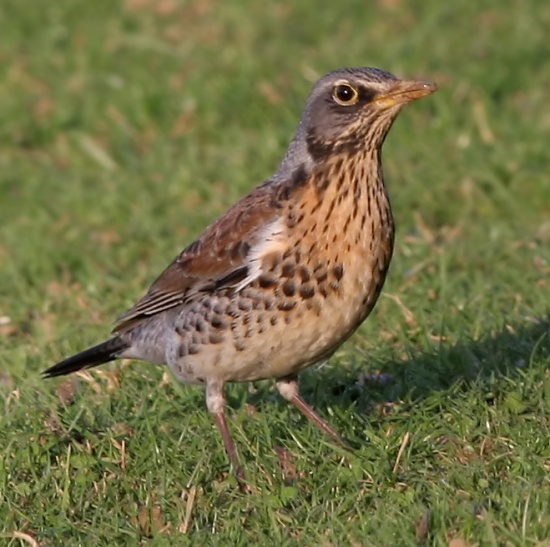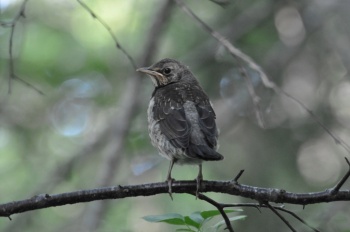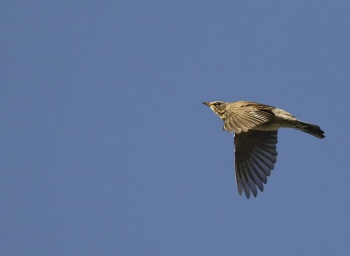m (Reverted edits by DanCLicks-111263 (Talk); changed back to last version by Deliatodd-18346) |
(Picture of juvenile. References updated) |
||
| Line 9: | Line 9: | ||
*Black-tipped yellow bill | *Black-tipped yellow bill | ||
==Distribution== | ==Distribution== | ||
| − | [[Image: | + | [[Image:Babe in the woods.jpg|thumb|350px|right|Juvenile<br />Photo by {{user|Doc Duck|Doc Duck}}<br />Trondheim, [[Norway]], June 2013]] |
'''Breeds''' in north [[Denmark]] and across virtually the whole of [[Scandinavia]], and from eastern [[France]] and the Alps east across [[Europe]] to the Urals. Breeds in very small numbers most years in [[Scotland]] and has bred elsewhere in [[Britain]] including northern and south-eastern [[England]] and in [[Iceland]]. First recorded breeding for [[Bulgaria]] occurred in 1993. There is also a small breeding population in [[Greenland]]. | '''Breeds''' in north [[Denmark]] and across virtually the whole of [[Scandinavia]], and from eastern [[France]] and the Alps east across [[Europe]] to the Urals. Breeds in very small numbers most years in [[Scotland]] and has bred elsewhere in [[Britain]] including northern and south-eastern [[England]] and in [[Iceland]]. First recorded breeding for [[Bulgaria]] occurred in 1993. There is also a small breeding population in [[Greenland]]. | ||
| Line 18: | Line 18: | ||
This is a [[Dictionary_M-S#M|monotypic]] species<sup>[[#References|[1]]]</sup>. | This is a [[Dictionary_M-S#M|monotypic]] species<sup>[[#References|[1]]]</sup>. | ||
==Habitat== | ==Habitat== | ||
| + | [[Image:177K7425.jpg|thumb|350px|right|Photo by {{user|targetman|targetman}}<br />[[Lincolnshire]]]] | ||
Breeds in open birch, alder or coniferous woodland, often in damp areas and along rivers. Also in more open, moorland-type habitats with stunted trees and rocky outcrops. On passage and in winter on damp and grassy fields interspersed with small woods and hedgerows. In severe weather often attracted to parks and gardens. | Breeds in open birch, alder or coniferous woodland, often in damp areas and along rivers. Also in more open, moorland-type habitats with stunted trees and rocky outcrops. On passage and in winter on damp and grassy fields interspersed with small woods and hedgerows. In severe weather often attracted to parks and gardens. | ||
==Behaviour== | ==Behaviour== | ||
| Line 26: | Line 27: | ||
''[[Media:Turdus pilaris (song).mp3|Listen in an external program]]'' | ''[[Media:Turdus pilaris (song).mp3|Listen in an external program]]'' | ||
==References== | ==References== | ||
| − | #{{Ref- | + | #{{Ref-Clements6thAug13}}#Birdwatchers Pocket Guide ISBN 1-85732-804-3 |
#BF Member observations | #BF Member observations | ||
{{ref}} | {{ref}} | ||
Revision as of 23:12, 29 August 2013
- Turdus pilaris
Identification
- Grey head
- Brown back
- Grey rump
- Black tail
- Underparts orangey-brown with dark streaks
- Black-tipped yellow bill
Distribution
Breeds in north Denmark and across virtually the whole of Scandinavia, and from eastern France and the Alps east across Europe to the Urals. Breeds in very small numbers most years in Scotland and has bred elsewhere in Britain including northern and south-eastern England and in Iceland. First recorded breeding for Bulgaria occurred in 1993. There is also a small breeding population in Greenland.
Birds from most of Scandinavia and north and east Russia are migratory, and those from the remainder of range partially migratory. Winter range includes Iceland, British Isles and southern parts of Sweden and Finland south to the Mediterranean from Iberia to Israel Rarely reaches North-West Africa but regular in Nile Delta.
Vagrants recorded in Svalbard, Bear Island and Jan Mayen, and also Madeira. The Greenland population has been the source of vagrants to north-east USA and Canada.
Taxonomy
This is a monotypic species[1].
Habitat
Breeds in open birch, alder or coniferous woodland, often in damp areas and along rivers. Also in more open, moorland-type habitats with stunted trees and rocky outcrops. On passage and in winter on damp and grassy fields interspersed with small woods and hedgerows. In severe weather often attracted to parks and gardens.
Behaviour
Highly gregarious during the winter, forming large mixed flocks of winter thrushes.
Vocalisation
Call: loud chack, chack, chack
<flashmp3>Turdus pilaris (song).mp3</flashmp3>
Listen in an external program
References
- Clements, J. F., T. S. Schulenberg, M. J. Iliff, B.L. Sullivan, C. L. Wood, and D. Roberson. 2013. The eBird/Clements checklist of birds of the world: Version 6.8., with updates to August 2013. Downloaded from http://www.birds.cornell.edu/clementschecklist/download/
- Birdwatchers Pocket Guide ISBN 1-85732-804-3
- BF Member observations
Recommended Citation
- BirdForum Opus contributors. (2024) Fieldfare. In: BirdForum, the forum for wild birds and birding. Retrieved 27 April 2024 from https://www.birdforum.net/opus/Fieldfare
External Links






